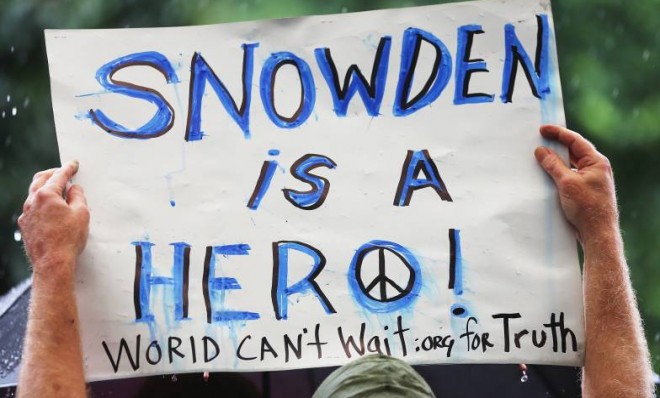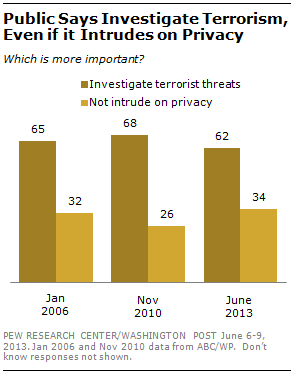Why the government's snooping is here to stay
Despite all the headlines, a new poll shows Americans are fine with the government spying on them


President Obama and his administration have faced tough questions over the past week, following the publication of leaked classified information that exposed new details about the scope and size of controversial intelligence-gathering practices carried out by the National Security Agency and the FBI.
Yet despite those revelations, a Washington Post-Pew Research Center poll released Monday suggested that the White House has little reason to fear a public backlash: A comfortable majority of Americans approves of the government's spying efforts. Furthermore, the survey indicated that public opinion on the issue has remained virtually unchanged over the years, even as new details about those efforts have emerged.
According to the poll, 56 percent of respondents said the NSA's tracking of millions of Americans' phone records was an "acceptable" way for the government to monitor terrorism, versus 41 percent who said it was not. Meanwhile, nearly two-thirds of respondents said it was more important for the government to investigate terrorism than to refrain from violating Americans' personal privacy.
The Week
Escape your echo chamber. Get the facts behind the news, plus analysis from multiple perspectives.

Sign up for The Week's Free Newsletters
From our morning news briefing to a weekly Good News Newsletter, get the best of The Week delivered directly to your inbox.
From our morning news briefing to a weekly Good News Newsletter, get the best of The Week delivered directly to your inbox.
Strikingly, that split was almost identical to what Pew found in 2010 and in 2006 — shortly after President George W. Bush's use of warrantless wiretaps became public.

That, Pew concluded, left "no indications that last week's revelations of the government's collection of phone records and internet data have altered fundamental public views about the tradeoff between investigating possible terrorism and protecting personal privacy."
While the overall percentages that supported or opposed such surveillance remained unchanged since 2006, the partisan makeup of those camps did. In 2006, 75 percent of Republicans approved of the NSA's actions, compared to just 37 percent of Democrats. In the latest survey, 52 percent of Republicans said the NSA's phone-tracking was acceptable, as did 64 percent of Democrats.
"Partisan hypocrisy, it would seem, infects members of both parties," said Juliet Lapidos at The New York Times. However, Lapidos also noted that Congress introduced new judicial safeguards after Bush's warrantless program was revealed, possibly setting Democrats' minds at ease.
A free daily email with the biggest news stories of the day – and the best features from TheWeek.com
Most strikingly, the poll found that respondents were closely split over whether the government should go even further to police terrorism than it currently does. While a slim 52 percent majority said the government should not be able to monitor everyone's emails, 45 percent said the government should have that authority.
Within the government, there is a near-universal consensus that the intelligence operations in question are legal and necessary. Even Republicans, who have taken every opportunity to keep a slew of White House scandals in the news, have lined up behind Obama on the issue.
What that all suggests is that there's practically no political pressure, either from inside the government or from the public, for the White House to curb its counterterrorism efforts and order the NSA to rein in its surveillance.
Jon Terbush is an associate editor at TheWeek.com covering politics, sports, and other things he finds interesting. He has previously written for Talking Points Memo, Raw Story, and Business Insider.
-
 Will AI kill the smartphone?
Will AI kill the smartphone?In The Spotlight OpenAI and Meta want to unseat the ‘Lennon and McCartney’ of the gadget era
-
 Must-see bookshops around the UK
Must-see bookshops around the UKThe Week Recommends Lose yourself in beautiful surroundings, whiling away the hours looking for a good book
-
 A Nipah virus outbreak in India has brought back Covid-era surveillance
A Nipah virus outbreak in India has brought back Covid-era surveillanceUnder the radar The disease can spread through animals and humans
-
 The billionaires’ wealth tax: a catastrophe for California?
The billionaires’ wealth tax: a catastrophe for California?Talking Point Peter Thiel and Larry Page preparing to change state residency
-
 Bari Weiss’ ‘60 Minutes’ scandal is about more than one report
Bari Weiss’ ‘60 Minutes’ scandal is about more than one reportIN THE SPOTLIGHT By blocking an approved segment on a controversial prison holding US deportees in El Salvador, the editor-in-chief of CBS News has become the main story
-
 Has Zohran Mamdani shown the Democrats how to win again?
Has Zohran Mamdani shown the Democrats how to win again?Today’s Big Question New York City mayoral election touted as victory for left-wing populists but moderate centrist wins elsewhere present more complex path for Democratic Party
-
 Millions turn out for anti-Trump ‘No Kings’ rallies
Millions turn out for anti-Trump ‘No Kings’ ralliesSpeed Read An estimated 7 million people participated, 2 million more than at the first ‘No Kings’ protest in June
-
 Ghislaine Maxwell: angling for a Trump pardon
Ghislaine Maxwell: angling for a Trump pardonTalking Point Convicted sex trafficker's testimony could shed new light on president's links to Jeffrey Epstein
-
 The last words and final moments of 40 presidents
The last words and final moments of 40 presidentsThe Explainer Some are eloquent quotes worthy of the holders of the highest office in the nation, and others... aren't
-
 The JFK files: the truth at last?
The JFK files: the truth at last?In The Spotlight More than 64,000 previously classified documents relating the 1963 assassination of John F. Kennedy have been released by the Trump administration
-
 'Seriously, not literally': how should the world take Donald Trump?
'Seriously, not literally': how should the world take Donald Trump?Today's big question White House rhetoric and reality look likely to become increasingly blurred
